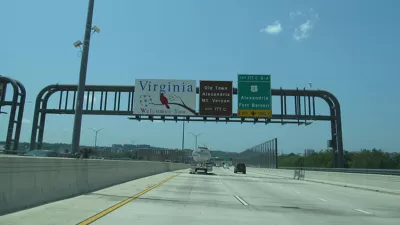Recent financial disclosures from the company that operates the Capital Beltway's new high-occupancy toll (HOT) lanes in northern Virginia show that the lanes lost $11.3 million in their first six weeks of operation with fewer users than expected.
Australian-based toll road developer Transurban, who helped build and now operates, the new Beltway Express Lanes, has reported to investors that over their first six weeks of operation, "[t]he lanes raked in $800,000 in tolls and $200,000 in fees and other revenue but had $3.2 million in operating costs, as well as depreciation of $2.1 million and financing costs of $7 million," reports Liz Essley. The lanes, which opened last November to much optimism among District area planners "trying to cope with the public’s desire for congestion relief and determination not to pay more taxes for a solution," were used by less than half the amount of vehicles projected by a traffic consultant to the project.
"But company representatives say it's too early to despair," notes Essley. "'We're still definitely in the ramp-up period. This is such a major change in the traffic patterns in the region. We've opened a highway within a highway,' said 495 Express Lanes spokeswoman Pierce Coffee. 'It's really so early that it's too soon to tell.'"
"But if the lanes continue losing money in the long term, Virginia taxpayers would miss out on much-needed road money," explains Essley. "According to the agreement that Transurban and other private partners made with the commonwealth, Virginia will get 30 percent of the lanes' revenue if the project is a financial success, once the debt used to build the $1.7 billion project has been paid off."
FULL STORY: New Beltway Express Lanes losing money

Alabama: Trump Terminates Settlements for Black Communities Harmed By Raw Sewage
Trump deemed the landmark civil rights agreement “illegal DEI and environmental justice policy.”

Planetizen Federal Action Tracker
A weekly monitor of how Trump’s orders and actions are impacting planners and planning in America.

Why Should We Subsidize Public Transportation?
Many public transit agencies face financial stress due to rising costs, declining fare revenue, and declining subsidies. Transit advocates must provide a strong business case for increasing public transit funding.

Understanding Road Diets
An explainer from Momentum highlights the advantages of reducing vehicle lanes in favor of more bike, transit, and pedestrian infrastructure.

New California Law Regulates Warehouse Pollution
A new law tightens building and emissions regulations for large distribution warehouses to mitigate air pollution and traffic in surrounding communities.

Phoenix Announces Opening Date for Light Rail Extension
The South Central extension will connect South Phoenix to downtown and other major hubs starting on June 7.
Urban Design for Planners 1: Software Tools
This six-course series explores essential urban design concepts using open source software and equips planners with the tools they need to participate fully in the urban design process.
Planning for Universal Design
Learn the tools for implementing Universal Design in planning regulations.
Caltrans
Smith Gee Studio
Institute for Housing and Urban Development Studies (IHS)
City of Grandview
Harvard GSD Executive Education
Toledo-Lucas County Plan Commissions
Salt Lake City
NYU Wagner Graduate School of Public Service



























